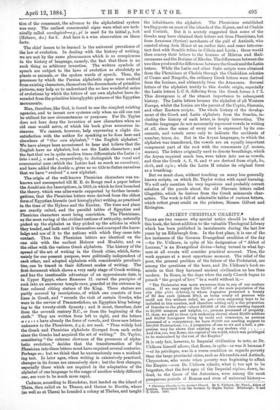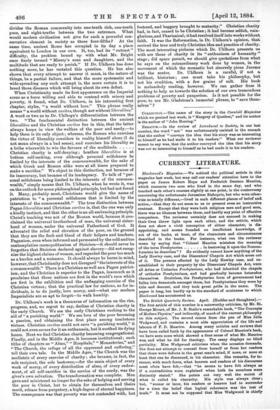ANCIENT CHRISTIAN CHARITY.*
Timan are two reasons why special notice should be taken of this book, the latest addition to the valuable Theological Library which has been published in instalments during the last few
years by an Edinburgh firm. In the first place, it is one of the
few instances of the German Evangelical erudition of the day —for Dr. Uhlhorn, in spite of his designation of "Abbot of Loccum," is an Evangelical divine—being turned to what lay-
men at all events will consider practical account. Then, the work appears at a most opportune moment. The relief of the poor, the general problem of the future of the Proletariat, are among the questions of the hour, and Dr. Uhlhorn's book re-
minds us that they harassed ancient civilisation no leas than modern. In Rome, in the days when the early Church began to preach "the gospel of love " to a world without it,— " The Proletariat was more numerous than in any of our modern cities. If we may regard the 32,000 of the male population of the city (the plebs urbana), to whom Augustus presented a bounty of 60 den each (almost 50s.), as being nearly all persons who could not live without relief, we get—even supposing boys to be included in this number, and therefore adding only a due proportion of females to the plebs—about 580,000 of the class needing support to 10,000 senators and knights, i.e., persons possessed of property. if, then, we add to these (not reckoning slaves) about 20,000 soldiers and 60,000 foreigners living by trade and commerce, as persons possessed of a competency, we have 90,000 not needing support to 580,000 Proletarians, i.e., a proportion of•one to six and a half, a pro- portion very far above that existing in any modern city And this, too, was Rome, the capital of the world, which was privileged to be maintained by the rest of the Empire."
It is only fair, however, to Imperial civilisation to note, as Dr. Uhlhorn himself allows, that Rome, in spite—or was it because P —of its privileges, was in a worse condition as regards poverty than the large provincial cities, such as Alexandria and Antioch. Chrysostom, who wrote when poverty was beginning to affect the Empire—even Dr. Uhlhorn admits, what is too apt to be forgotten, that the first ages of the Imperial regime, down, in- deed, to the times of the Antonines, were among the most prosperous periods of Roman and even of universal history- • Christian Charity in the Ancient Church. By G. Uhlhorn, Dr. Theol., Abbot of Loconm. Translated from the German by Sophia Taylor. Edinburgh: T. and. T. Clark. 1883.
divides the Roman community into one-tenth rich, one-tenth poor, and eight-tenths between the two extremes. What would modern civilisation not give for such a powerful con- servative element in society as these four-fifths ? At the same time, ancient Rome has occupied in its day a place equivalent to London in our own. It, too, had its " outcast " difficulty, the problem bound up with what Mr. Bright once finely termed "Misery's sons and daughters, and the multitude that are ready to perish." If Dr. Uhlhorn has done nothing more, he has restated this question. He has also shown that every attempt to answer it must, in the nature of things, be a partial failure, and that the more systematic and wide-spreading any such attempt is, the more certain it is to breed those diseases which will bring about its own defeat.
When Christianity made its first appearance on the Imperial scene as a force wining and able to contend with misery and poverty, it found, what Dr. Uhlhorn, in his interesting first chapter, styles, "a world without love." This phrase really means " a world without caritas, though not without liberalitas." A word or two as to Dr. Uhlhorn's differentiation between the two. "The fundamental distinction between the ancient liberalitas and the Christian caritas lies in this, that the latter always keeps in view the welfare of the poor and needy,—to help them is its only object ; whereas, the Roman who exercises the virtue of liberality considers in reality himself alone (I do not mean always in a bad sense), and exercises his liberality as a bribe wherewith to win the favours of the multitude Christian charity is self-denying ; heathen liberalitas is at bottom self-seeking, even although personal selfishness be limited by the interests of the commonwealth, for the sake of which Greek and Roman alike were at all times prepared to make a sacrifice." We object to this distinction, not because of its inaccuracy, but because of its inadequacy. To talk of "per- sonal selfishness being limited to the interests of the common- wealth," simply means that Dr. Uhlhorn, when he wrote it, was on the outlook for some philosophical principle, but had not found it. Many, probably most, Christians would give the name of patriotism to "a personal selfishness that is limited by the interests of the commonwealth." The true distinction between Pagan liberalitas and Christian caritas is, that the one was only a kindly instinct, and that the other is an all-embracing principle. Christ's teaching was not of the Roman world, because it pro- claimed the universal brotherhood of man, the universal sister- hood of woman, under the universal Fatherhood of God. It advocated the relief and elevation of the poor, on the ground that they are the flesh and blood of their helpers and teachers. Paganism, even when informed and permeated by the cold and too contemplative cosmopolitanism of Stoicism—it should never be forgotten that Stoicism declared against slavery—did not recog- nise the highest claims of women, and regarded the poor too much as a burden and a nuisance. It should always be borne in mind, however, that Christianity does not disregard "the interests of the cmamonwealth." There is a Christian as well as a Pagan patriot- ism, and the Christian is superior to the Pagan, inasmuch as it proclaims that those nations are first in the world's race which are first in the exhibition and the unflagging exercise of the Christian virtues ; that the practical law for nations, as for in- dividuals, is to do justly, love mercy, and—what our modern Imperialists are so apt to forget—to walk humbly.
Dr. Uhlhorn's work is a thesaurus of information on the rise, progress, and, we regret to say, decline of Christian charity in the early Church. We see the early Christians rushing to the aid of" a perishing world." We see love of the poor becoming a passion, and obtaining the first place among tombstone virtues. Christian caritas could not save "a perishing world," it could not even secure for it an euthanasia, but it soothed its dying hours. Next we find Christian charity becoming congregational. Finally, and in the Middle Ages, it becomes institutional; such titles of chapters as "Alms," "Hospitals," "Monasteries," and "The Church, the refuge of all the oppressed and suffering," tell their own tale. In the Middle Ages, "the Church was the mediatris of every exercise of charity ; she became, in fact, the sole recipient, the sole bestower,—for the main object of every work of mercy, of every distribution of alms, of every endow- ment, of all self-sacrifice in the service of the needy, was the giver's own salvation. The transformation was complete. Men gave and ministered no longer for the sake of helping and serving the poor in Christ, but to obtain for themselves and theirs merit, release from purgatory, a high degree of eternal happiness. The consequence was that poverty was not contended with, but
fostered, and beggary brought to maturity." Christian charity had, in fact, ceased to be Christian ; it had become selfish, vain- glorious, and Pharisaical; it h ad resolved itself into works without faith. It was the Reformation, in Dr. Uhlhorn's opinion, that revived the true and truly Christian idea and practice of charity. The most interesting pictures which Dr. Uhlhorn presents us with are those of charity in its "enthusiasm of humanity stage ; did space permit, we should give quotations from what he says on the extraordinary work done by women, in the movement of which the monastic but sincerely pions Jerome was the centre. Dr. Uhlhorn is a careful, if not a. brilliant, historian ; one must take his philosophy, but not his erudition, with a few grains of salt. His book is melancholy reading, however. We can gather from it nothing to help us towards the solution of our own tremendous problems of poverty and pauperism. Is it not possible for the poor, to use Mr. Gladstone's immortal phrase, to "save them- selves" ?



































 Previous page
Previous page